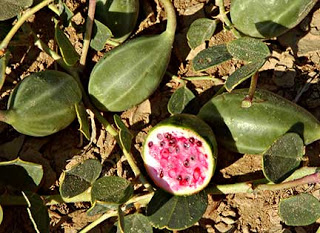Here is a post card picture of the salt pan at Lingua on the southeast corner of Salina. To the left is Santa Marina and the road that continues to Capo Faro, Malfa and Pollara.
At this angle, the background island is probably Lipari.
In a salt pan, seawater is pumped into the shallow holding tank or simply allowed to enter through channels at high tide. The sun then does its work by evaporating the water and allowing the salt to crystalize. The resulting wet salt is turned in the sun to help the evaporation, then piled and put into containers as the salt dries. Sometimes the salt is infected with bacteria producing a pink pigment and other minerals will tint it.
There are many Salt Pans in Italy, but especially in western Sicily along the west coast not too far from Palermo.
Salina means Salt Mill hence the island is named for it.
There were few sources for salt in the classical world. Places like Saltzburg and Hallstatt in Austria became rich from salt mined in the area. Hallstatt was a major cultural center in Celtic Europe, a source of many archeological finds. The sea has always been a source of salt even in the earliest times, and if salt from inland sources was not available, salt was a cash source through trading.
Salt was useful for preserving meats before refrigeration(The islanders hung meat in their cisterns for short periods to preserve it as well) and also for preserving herbs, olives and capers. Olives have been produced here for centuries, but Salina is famous for its capers. They are most often larger than the tiny capers found in bottles and are purchased in a heavy sprinkling of salt crystals. These have always been a major export for Salina.
When the buds are overlooked, the flowers bloom on the caper bush. If they are allowed to develop, the resulting fruit of the caper is vaguely pear shaped and full of seeds that are pickled in brine as Caper Berries.





No comments:
Post a Comment